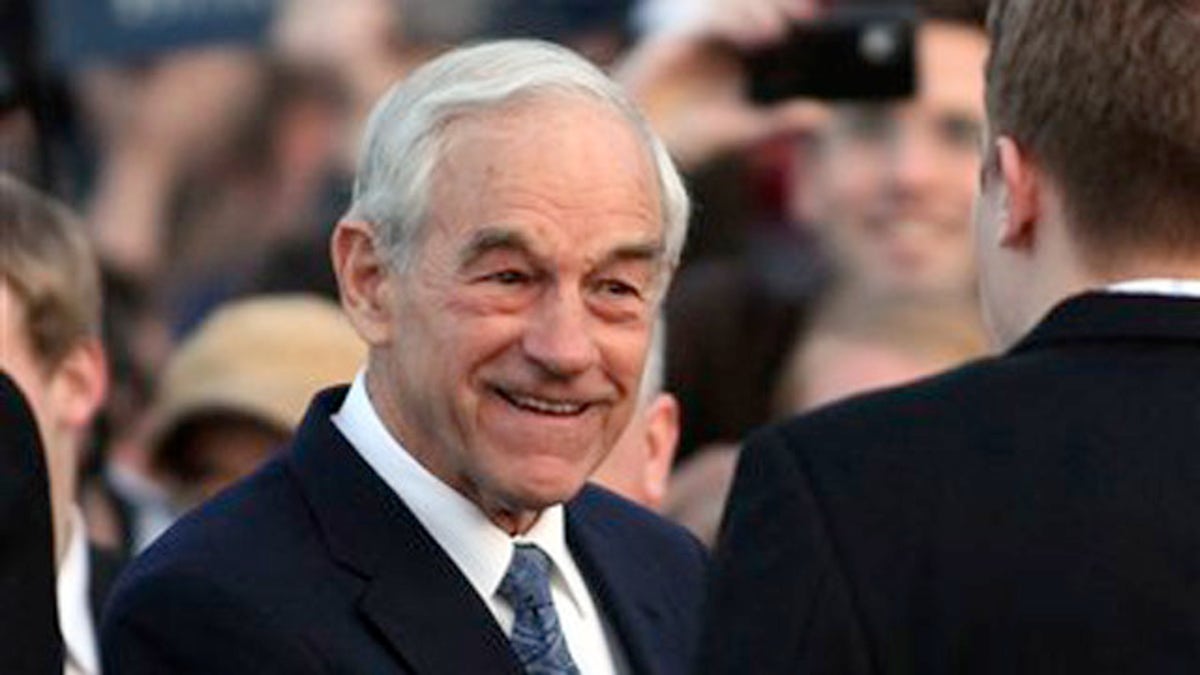
Republican presidential candidate Ron Paul arrives at a campaign event at the University of Wisconsin campus in Madison, Wis., on Thursday, March 29, 2012. (AP Photo/Wisconsin State Journal, Craig Schreiner)
The Ron Paul "revolution" has gotten awfully quiet.
The Republican presidential candidate, whose past two bids for the presidency turned him into a cult hero among college students and libertarians alike, appears to be winding down on the trail. His operation went dark for a total of 18 days last month, holding no campaign events. So far this month, he's held just one.
But the Texas congressman is showing no sign of packing it in, demonstrating that the campaign was always about more than winning delegates -- or having a shot at the nomination.
Paul is dead last by most every measure, having won none of the 38 primaries or caucuses so far and having collected just 51 delegates compared with 655 for front-runner Mitt Romney in the race to get 1,144 and win the party nomination. The candidate did not appear to pick up any delegates in Tuesday's contests in Maryland, Wisconsin and the District of Columbia.
“What is the purpose of stopping?” Paul asked during a radio interview this week on WMAL Washington radio. “It seems strange if there’s a campaign going on with no winner. You should just fold the tent and leave? … It’s still important to try to get people to talk about what they ought to be talking about.”
Paul, unlike the other non-Romney candidates, is not the subject of public pressure campaigns to drop out -- perhaps because he's not actually winning many delegates or personally posing a threat to Romney's chances of wrapping up the nomination before the convention. He has the luxury of taking it easy at this stage, without fending off calls by party leaders to stand aside. Paul, looking far ahead, has scheduled a campaign town hall Wednesday night in California, a state that doesn't hold its primary until June.
Elliot Curson, a media consultant on Ronald Reagan’s 1980 presidential campaign, said the candidate "really has nothing to lose by staying in the race and talking about what he believes in."
Paul trails by a fair distance both Rick Santorum and Newt Gingrich, who has acknowledged Romney will likely win the nomination but is now reportedly trying to win enough delegates to adopt a series of proposals to hold Romney to conservative positions.
That plan has left more than a few people scratching their heads including Curson.
“He gets sidetracked too easily,” Curson said of Gingrich. “It’s too much. Here’s my label and your label doesn’t count.”
Meanwhile, the 76-year-old Paul continues to drive home a range of causes, like eliminating the Federal Reserve and pulling U.S. forces out of Afghanistan. Those talking points gained currency over the course of the campaign, even as some opponents accused him of touting an isolationist foreign policy. Even Gingrich recently has drifted toward Paul on the prospect of an Afghanistan war pullout.
Paul officials declined to comment to FoxNews.com on the state of the campaign.
However, the lack of money compared with Romney’s campaign has likely been a contributing factor.
Paul had $1.6 million in cash on hand compared against $7.68 million for Romney, according to the most recent federal filings. Romney's super PAC is far more well-funded than the one supporting Paul.
Curson called Paul’s most recent campaign strategy, after a surge this winter, “old guerrilla tactics,” and said Paul needs to rely on inexpensive means like local radio to get out his message.
Still, Curson thinks Paul must find a way to make his views “palatable, not behind the times” in primaries remaining in the more moderate states.
Conservative activist Morton C. Blackwell credits Paul with “bringing a substantial number of previously engaged people into politics.”
“That’s a long-term plus,” he said. “And at what point does the race really end? This will long be remembered as the year of surprises.”




